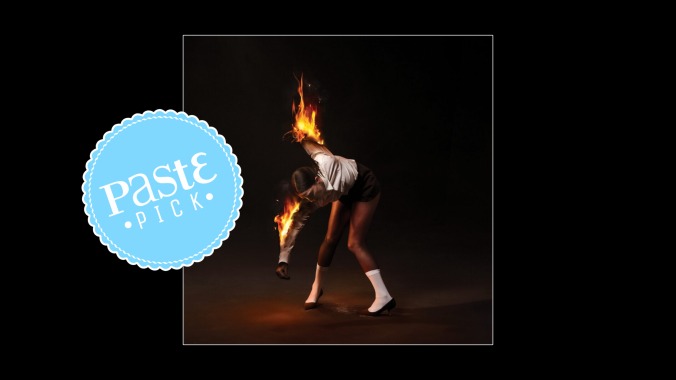On All Born Screaming, St. Vincent Sees the Unknown as Opportunity
The iconic, chameleonic rocker’s course-correcting seventh solo album is as harrowing as it is hopeful—and her heaviest yet.
Music Reviews St. Vincent
Annie Clark is back. Sure, there is a new St. Vincent album, but that’s not what I mean. For the first time in over a decade, Clark has entered a phase of her career without a flashy new look—no eye-catching wig, and no character to portray. Her titanic 2014 self-titled album was adorned with a portrait of her atop a sterile throne with gray wispy curls, a cult leader for the digital age. Her 2017 follow-up, Masseduction, found her in the vibrant guise of a dominatrix with a new, whip-smart pop sound. Then came her first misstep: 2021’s Daddy’s Home. Borrowing from the sounds and styles of the 1970s, Clark wrapped herself up in a questionable Candy Darling cosplay. Her second collaboration with Jack Antonoff, Daddy’s Home, lacked the focus on her genius-level guitar prowess and was bereft of her trademark urgency. Songs like “The Melting of The Sun” and “Down” made up for this as best they could—but Clark is a visionary, and something so backward-glancing felt lesser.
Now though, we just have Annie Clark. Her seventh album, All Born Screaming, comes accompanied by highly stylized images of her set against a total darkness that feels primed to swallow her. It’s fitting, as oblivion weighs heavily over every song. This also marks the first time Clark has produced herself, having previously done so for Sleater-Kinney on The Center Won’t Hold. If you share my opinion of that record, please don’t let it color your impressions of All Born Screaming Clark has said she had to take over production because she couldn’t figure out how to articulate the sounds in her head to somebody else. Listening to the finished product, it’s easy to see what she means.
The surreal, slippery “Hell Is Near” is unlike anything Clark has done before—and particularly difficult to fully capture with words. Broadly psychedelic, a collage of 12-string guitar, piano and hydra-synth creates a song that feels like its own pocket dimension. Though the title may portend a fiery, eternal punishment, it’s more purgatorial in tone—its abundant distortion spilling over into “Reckless,” a song that opens with a funeral march. Clark prods at the finality of loss, knowing that memory keeps those we’ve lost alive; “Every part of you is in me now / There’s no going back / I breathe you out,” she contends. After a few minutes existing as a dirge, “Reckless” erupts and radar-like synths squeal, programmed drums act as both skittering pests and brute force boots barreling down to quash them as Clark’s voice calls out, lost in it all.
All Born Screaming loses no momentum as the dust settles and “Broken Man” begins. Over the metallic clank of drum machines, Clark breathlessly boasts about how she can “make your kingdom come.” Initially, it’s a sexy, slinky song—something that would have felt right amidst the neon leather tempest of Masseduction—but quickly her demeanor becomes more foreboding and confrontational, and her trademark jagged guitars descend. Dave Grohl takes over on drums, and it becomes something else entirely. It’s a massive song—a series of ideas stacked on top of each other—and, somehow, never topples under its own weight.
The concept of collapse, though, runs rampant throughout All Born Screaming. Clark has long written about societal ills, whether they be social media narcissism, widespread vanity or the stifling nature of gender roles. Usually, she observes such topics with an outsider’s wit. On songs like “The Power’s Out” and “Violent Times,” the issues are all-consuming; she can’t escape their grasp. On the former, Clark narrates catastrophe with a newscaster’s unflappable affect. As she navigates a post-technological world, she describes things with a fatalistic romanticism while facing the void with acceptance: “It was pouring like a movie / Every stranger looked like they knew me / Handsome cowboys praying gothic said / I just remembered being happy.”
Where “The Power’s Out” calls out cinema by name without its otherworldly potential, “Violent Times” leans into the trappings of it wholeheartedly. The ‘70s pastiche that permeated Daddy’s Home has been done away with, but there are shades of it left on All Born Screaming with its melodramatic opener recalling that of “Down and Out Downtown.” Here, Clark tackles tragedy with more defiance, searching for a love she’s been separated from amidst the rubble—even going as far as likening them to the embracing lovers found in the ruins of Pompeii. Clark’s vocal performance on “Violent Times” is particularly impressive, at times soft and conversational, and at others a fearsome wail.
Though she did not know SOPHIE personally, Clark has said that the story of her unfortunate passing resonated with her—so she wrote about it. The pop innovator’s fateful climb onto a roof in Athens to get a clearer view of the moon comes up in the first lines of “Sweetest Fruit.” As Clark goes on to sing about a friend who takes a bus trip across America, it becomes apparent that the song isn’t really about any of them, that it’s about being unafraid of something bigger than us, even curious about it. It’s remarkable that nearly two decades into a storied career, Clark still sees opportunity as something ripe for the taking.
Read our recent Digital Cover Story on St. Vincent here.
Eric Bennett is a music critic in Philadelphia with bylines at Pitchfork, Post-Trash and The Alternative. They are also a co-host of Endless Scroll, a weekly podcast covering the intersection of music and internet culture. You can follow them on Twitter @violet_by_hole.